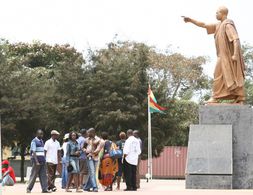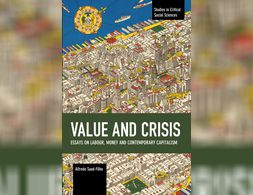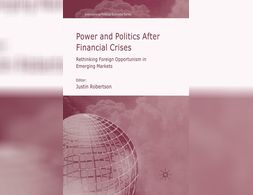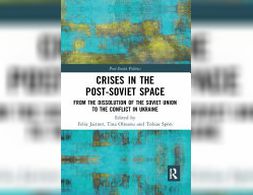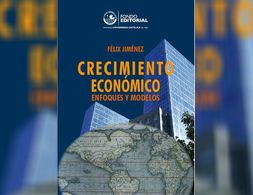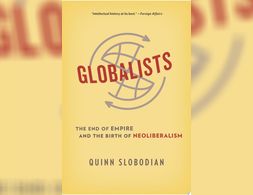✕
61 results
This article introduces the series, “Reclaiming Africa’s Early Post- Independence History,'' from Post-Colonialisms Today. It explores the policies and thinking of African governments in the early post-independence period, and the lessons for today’s struggles for political and economic agency on the continent.
In this roundtable conversation, Post-Colonialisms Today members, Omar Ghannam, Kareem Megahed and Tetteh Hormeku-Ajei, look to policies from early post-independence Africa to tackle issues exacerbated by the COVID- 19 pandemic.
In this article, Tetteh Hormeku-Ajei and Camden Goetz discuss the ongoing impacts of colonialism on Africa’s natural resources.
In this article, Jihen Chandoul discusses the importance of food sovereignty in Africa, reflecting on the continent’s early post independence movements for self sufficiency.
"Yuliya Yurchenko is a senior lecturer and researcher in political economy at University of Greenwich. She is currently in Ukraine on an extraordinary leave. And while she writes that she is, for the moment, in relative safety, that could change any moment. Being a Ukrainian, an activist and an academic, Yuliya traveled to Ukraine on Feb 19, 2022 as part of a fact-finding and solidarity mission with a number of MPs, trade unionists and journalists. The goal, she says, of this mission is to connect with civil society organizations, trade unions, activists and politicians, and “to express direct, cross-border solidarity from the UK working class to the Ukrainian working class.”
To celebrate the forthcoming book A brief history of Economic Thought From the Mercantilists to the Post Keynesians edited by Louis Philippe Rochon and Hassan Bougrine Edward Elgar Louis Philippe Rochon sat down with celebrated author and scholar Sergio Rossi to discuss his contribution Milton Friedman and the Monetarist School …
Gerald Friedman UMassEconomics University of Massachusetts at Amherst
Neoliberalism is dead. Again. After the election of Trump and the victory of Brexit in 2016, many diagnosed the demise of the ideology of Margaret Thatcher, Ronald Reagan, Augusto Pinochet, and the WTO. Yet the philosophy of the free market and the strong state has an uncanny capacity to survive and even thrive in crisis.
Heterodox Macroeconomics offers a detailed understanding of the foundations of the recent global financial crisis
Diane Perrons and Sigrid Stagl combine feminist and critical environmental economics perspectives to develop a critique of the free market growth model and offer new ideas for a more sustainable gender equitable model of development in the interests of all.
Until the end of the early 1970s, from a history of economic thought perspective, the mainstream in economics was pluralist, but once neoclassical economics became totally dominant it claimed the mainstream as its own. Since then, alternative views and schools of economics increasingly became minorities in the discipline and were considered 'heterodox'.
Value and Crisis brings together selected essays written by Alfredo Saad-Filho, one of the most prominent Marxist political economists writing today. Divided into two parts, "Essays on the Theory of Value" and "Essays on Contemporary Capitalism," this book examines the labour theory of value from a rich and innovative perspective from which fresh insights are derived.
Foreign exploitation of economic crises in the developing world has been a central claim of neoliberal critics. This important and recurring international theme is the subject of closer scrutiny in this new collection, where contributors offer competing interpretations of the interaction between international and domestic forces after crises.
This fresh and unique textbook provides students and general readers with an introduction to economics from a new and much needed perspective, characterised by its uniquely pluralist, sustainable, progressive and global approach.
Unlike traditional textbooks, Introducing a New Economics contains the key concepts of pluralism, sustainability and justice. It provides students with the central questions covered by economics including resources, work, employment, poverty, inequality, power, capital, markets, money, debt and value.
It has become a contentious term in- and outside of economic policy: austerity. Allegedly the culprit behind the shortfalls of governments' reaction to the Great Financial Crisis, the policy makes for a spirited debate.
With a focus on Chile, Pinochet’s Economic Accomplices: An Unequal Country byForce uses theoretical arguments and empirical studies to argue that focusing onthe behavior of economic actors of the dictatorship is crucial to achieve basic objectivesin terms of justice, memory, reparation, and non-repetition measures.
This book highlights the political economy of wealth and income inequality in Latin America. The author segments his analysis to separately evaluate the economic, social, and political costs of inequality building on country case studies. It draws well-contextualized lessons from the Latin American experience that is important to consider for other regional contexts, especially for social policies of nations within the 'Middle Income Trap'.
In this book, the author, Intan Suwandi, engages with the question of imperialism through the specific channel of Global Value Chains.
This edited volume put together by Jimi Adesina based on the proceedings of the Social Policy in African Conference in 2017 provides an overview of social policy in varied country contexts and fields especially in light of decades of the reduction in size and hollowing out of the content of …
From the Dissolution of the Soviet Union to the Conflict in Ukraine The breakup of the Soviet Union led to the creation of new states and territorial conflicts of different levels of intensity Scrutinising the post Soviet period this volume offers explanations for both the frequency and the intensity of …
As the world's energy system faces a period of unprecedented change, a global struggle over who controls the sector--and for what purposes--is intensifying. The question of "green capitalism" is now unavoidable, for capitalist planners and anti-capitalist struggles alike.
Has neoliberalism destroyed gender equality Advocate author and broadcaster Beatrix Campbell examines the emergence of a new model of patriarchy and proposes solutions Beatrix Campbell iai
Crecimiento económico. Enfoques y modelos aborda las teorías del crecimiento de las economías de mercado con énfasis en los factores de la oferta. Asimismo, detalla los enfoques que, desde la vertiente Keynesiana, insisten en la importancia decisiva de los factores de demanda. A lo largo del presente volumen, Felix Jimenez ofrece perspectivas históricas y teóricas del desarrollo de los modelos de crecimiento económico y, para facilitar la comprensión del lector, incluye los desarrollos matemáticos de los modelos presentados.
In the first intellectual history of neoliberal globalism, Quinn Slobodian follows neoliberal thinkers from the Habsburg Empire’s fall to the creation of the World Trade Organization to show that neoliberalism emerged less to shrink government and abolish regulations than to deploy them globally to protect capitalism.
Financialization is one of the most innovative concepts to emerge in the field of political economy during the last three decades, although there is no agreement on what exactly it is. Profiting Without Producing by Costas Lapavitsas puts forth a distinctive view defining financialization in terms of the fundamental conduct of non-financial enterprises, banks and households.
Big challenges lie ahead for our society: increased automation of work, and the threat of catastrophic climate change. But so, too, are the huge possibilities presented by new technology and better ways of organising our economy in the wake of neoliberalism's failure.
So, what does racism have to do with our 21st century economic system? How can we understand institutions who uphold racism while claiming to value diversity and inclusion? And what does it mean to truly be anti-racist?
In Colonial Debts Rocío Zambrana develops the concept of neoliberal coloniality in light of Puerto Rico's debt crisis. Drawing on decolonial thought and praxis, Zambrana shows how debt functions as an apparatus of predation that transforms how neoliberalism operates.
The Privatized State shows how privatization undermines the very reason political institutions exist in the first place, and advocates for a new way of administering public affairs that is more democratic and just.
Necesitamos cookies. Pincha en “Aceptar” para ayudarnos a hacer de Exploring Economics una mejor plataforma.

